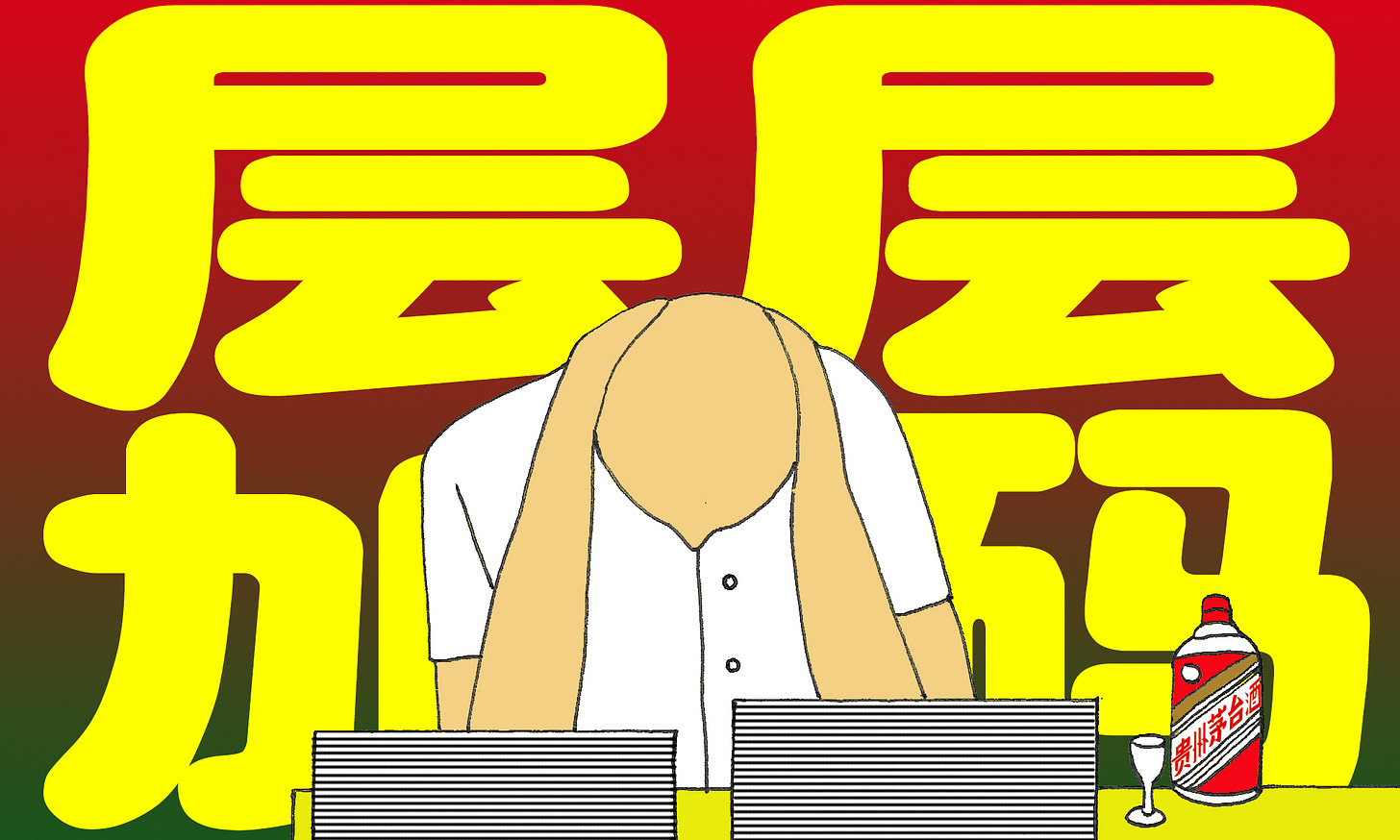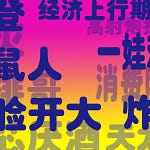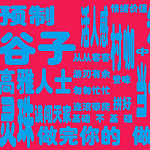Welcome to RealTime Mandarin, a free weekly newsletter that helps you improve your Mandarin in 10 minutes a week.
Subscribe today to get your fluency back, stay informed about China, and communicate with confidence in Chinese — all through immersion in real news.
In early May, an online meeting was held for officials in Yunnan province to "rectify" (纠治) drinking among government and party employees.
Chaired by the provincial Party Discipline Secretary, and attended by the Party Secretary of the province, two of the most senior officials in the Yunnan, this was the province’s most prominent push against official drinking yet.
Local state media was unsurprisingly vocal in support of the meeting and the ban:
“I won’t deny that drinking has its merits, whether for socialising or self-care. But this rectification is about drinking in violation of rules.
Just think, how can someone serve the people if they’re already drunk by midday? And if they’re drinking and partying into the night, how can they possibly show up for work properly the next morning?”
“我不否认喝酒有喝酒的好处,无论社交还是自洽。但这次纠治违规饮酒,重点强调的是违规,想想吧!大中午喝得二麻二麻的,怎么给人民当公仆?把酒言欢至深夜,大清早能把班上好?” [1]
This is part of a wider campaign against official drinking sweeping across China.
The new rules build on the far-reaching Eight-point Regulations (八项规定), introduced in December 2012 to improve Party conduct. The rules targeted excessive bureaucracy, lavish banquets, expensive official travel, and other forms of extravagance and misconduct linked to corruption.
The catalyst for this latest update was an incident which happened in April this year. During Qingming Festival the head of a state-owned enterprise in Huanggang (黄冈市) in Hubei Province, hosted a private dinner with local officials, and a visiting deputy district chief, which went badly wrong.
During the Moutai-fuelled meal, there was so much drinking that one of the attendees died from consuming too much alcohol.
In the aftermath, the participants tried to cover it up by falsely reporting who was at the dinner, conveniently removing the dead official from the guest list.
That backfired and was exposed in the media, and it was later condemned by the Central Commission for Discipline Inspection (中纪委, CCDI), the country’s corruption watchdog.
Officials across the country were sent into a panic, with study sessions on Party discipline hastily organised across all levels of provincial government. Soon after, provinces began introducing their own alcohol bans.
In some cases, such as in Yunnan, the new rules banned all alcohol consumption on working days (previously the Eight Points banned it for just lunch meetings), and approvals were required even when officials wanted to drink on weekends at private family gatherings:
The extreme nature of the policies has led to some entertaining wordplay on social media:
“In the past, if you drank too much, you would lose yourself.
But now, you will lose your job.”
“以前喝多了失态,现在喝多了失业”
But, it’s not just officials who are worried. Businesses are feeling the impact too.
One of the hardest-hit sectors is the rice wine (or baijiu 白酒) industry. Liquor brands have weathered similar storms before: back in 2012, the introduction of the Eight-point Regulations and the Six Bans (六项禁令) delivered a heavy blow. The high-end baijiu market hit the hardest, which relies heavily on gifting and official banquets.
Now, with a new wave of drinking bans, the pressure is mounting on these companies once again.
There’s also concern for the impact on local economies, especially in smaller townships in poorer parts of China:
"Right now, the main group with spending power is government-employed personnel.
But with the alcohol ban in place, restaurants are empty, evening barbecue stalls have no customers, and a large portion of the catering industry could disappear.
It will soon have a butterfly effect on other sectors like taxis and designated drivers."
“目前有能力消费的主要群体是国家编制人员,现在禁酒了,饭店没人了,晚上烧烤也没人了,大批餐饮行业会消失,后面就是出租车,代驾等蝴蝶效应。” [1]
That’s because public sector employees have relatively high salaries in these areas, and are a main source of spending, especially spending linked to eating and drinking out.
Since the alcohol bans were introduced, many government employees have stopped eating out altogether, for fear of violating the rules.
Now, many restaurants in smaller towns in provinces like Yunnan are facing losses, layoffs, and even closures.
Some restaurants are trying to pivot with new offerings, such as "alcohol-free meals" (无酒套餐) and cheaper set menus, and some are also turning to food delivery.
But with consumer spending down in a fiercely competitive market, small restaurants will struggle to survive if their main customers are no longer spending.
So there are concerns the policies are going too far, hitting the wider economy particularly in poorer parts of China, while not addressing underlying official corruption:
"The alcohol ban shouldn’t simply be about banning alcohol itself — it should be about targeting the corruption and shady dealings that often happen behind the scenes of drinking.
If authorities focus only on appearances and not the root causes, it risks putting the cart before the horse.
禁酒令的本质不应该是简单的禁酒,更应该禁的是酒背后的腐败和利益交易,如果不抓根本只抓形式,这会本末倒置的。[2]
So, that’s what we’re looking at this week!
🎧RTM Podcast Preview
This week on the RTM Advanced podcast, we explain three must-known phrases linked to drinking culture in China:
“Organise gatherings” (组局 zǔ jú)
“Drinking culture” 酒风 (jiǔ fēng)
“ A lively drinking party” (推杯换盏 tuī bēi huàn zhǎn)
Tune in at 6 minutes where we break down what they mean, how native speakers use them, and how you can use them in real conversations.
Favourite Five
1. 官场 guān chǎng
officialdom, government circles
支持者认为,禁令净化了官场风气,有效防范因酒滋生的腐败问题 – Supporters believe the ban has purged unhealthy trends in the civil service and effectively prevented corruption arising from drinking. [3]
2. 层层加码 céng céng jiā mǎ
bureaucratic overreach
从各地禁酒令规定的内容来看,我们只能用4个字来形容:层层加码 – There’s only one way to describe the alcohol bans issued across different regions: bureaucratic overreach. [2]
More: Read more about the military background of this phrase in tomorrow’s Phrase of the Week.
3. 如履薄冰 rú lǚ bó bīng
walk on thin ice, act with extreme caution
机关事业单位的工作人员外出就餐都是小心谨慎,如履薄冰 – Public institution employees are extremely cautious when dining out, as if walking on thin ice. [2]
Related:
小心翼翼 xiǎo xīn yì yì - with extreme caution, very carefully
4. 本末倒置 běn mò dào zhì
confuse the primary with the secondary, put the cart before the horse
如果不抓根本只抓形式,这会本末倒置的 – If authorities focus only on appearances and not the root causes, it risks putting the cart before the horse. [2]
5. 纸包不住火 zhǐ bāo bú zhù huǒ
the truth will come out, a secret can't be kept forever
后来纸包不住火,事情曝光之后引起了全社会的广泛关注 – Eventually, the cat was out of the bag. As the incident became known, it drew widespread attention. [2]
💡 Ready to get inspired to bridge the gap to real-world fluency? 💡
Every RTM post is packed with tools to inspire and help you get fluent.
It's designed to fit your busy life, your learning style, and your level—whether you’re “intermediate”, “advanced but rusty”, or “fluent with gaps”.
So, ready to finally get started and wave good bye to that nagging rusty feeling?
Let’s jump in👇















